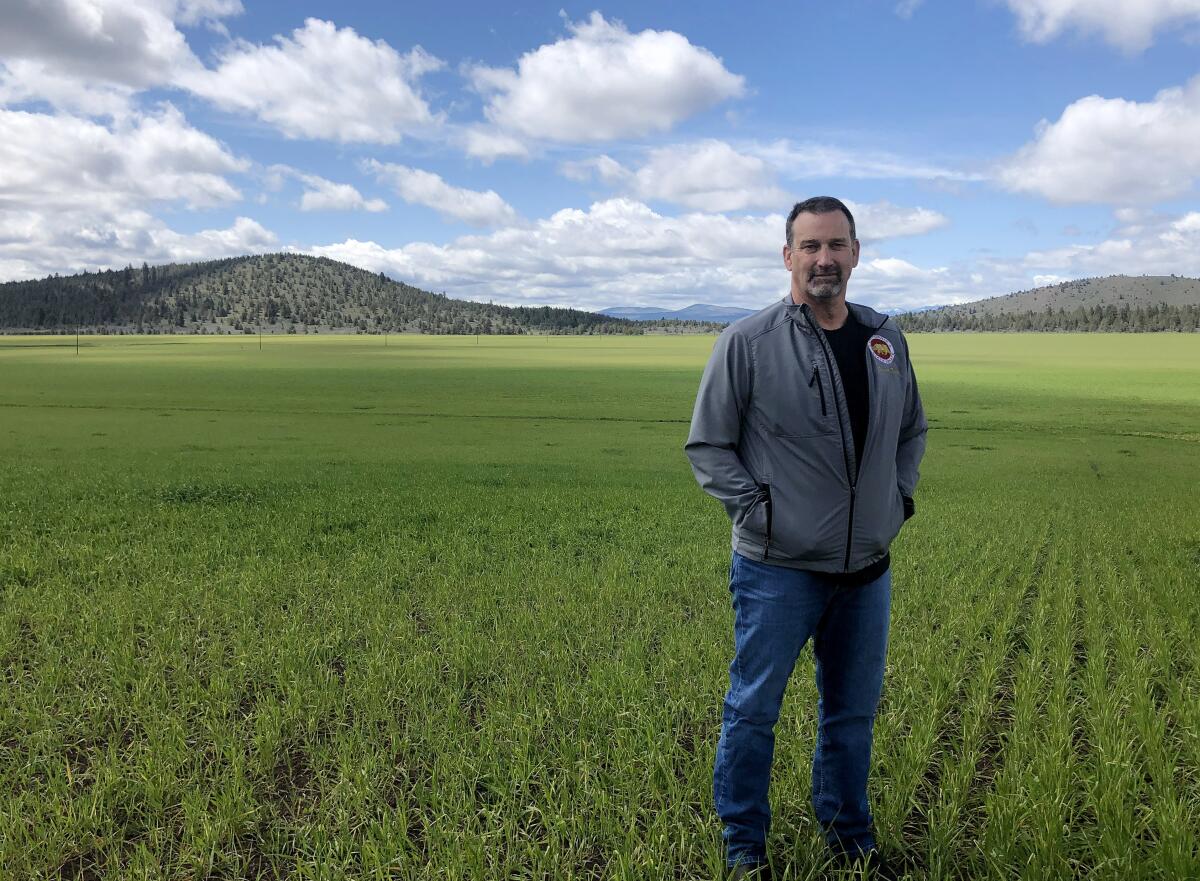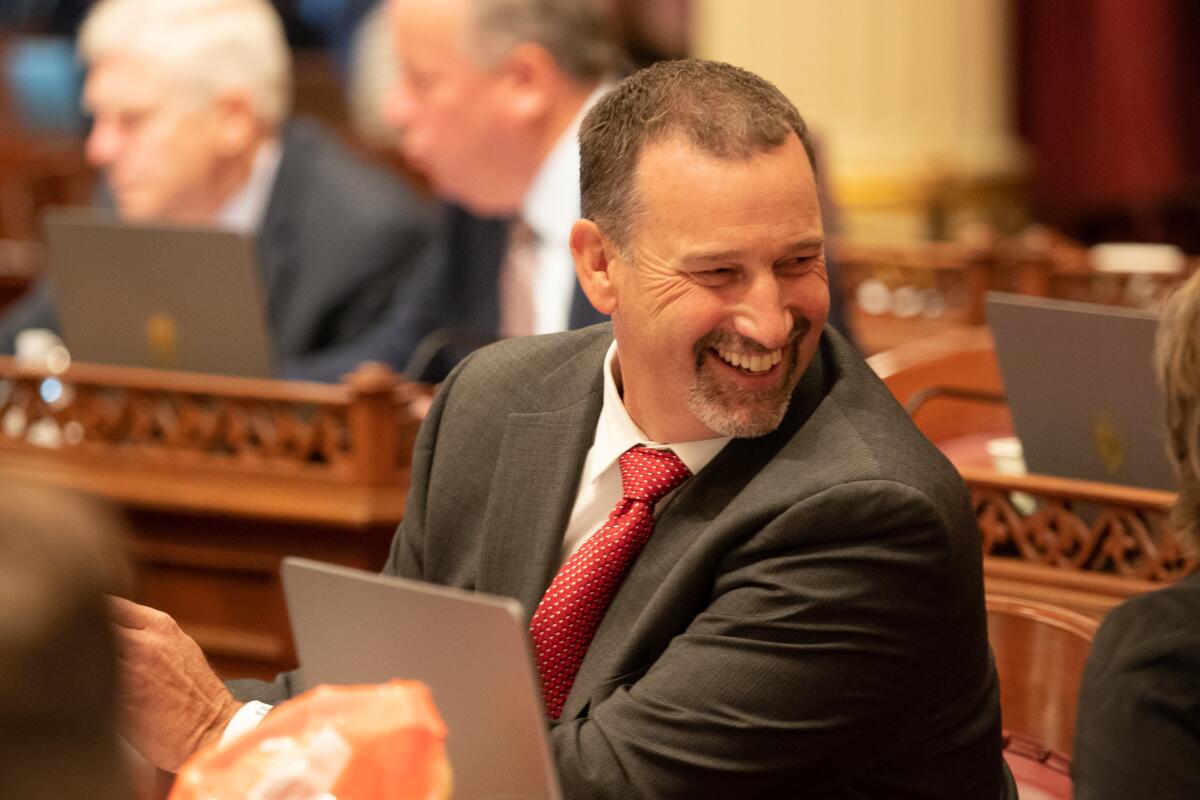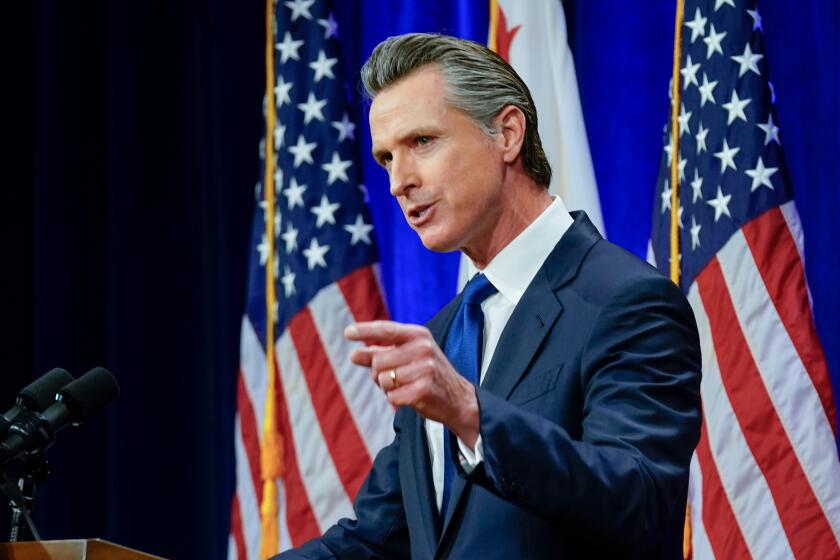In rural California, Republican Brian Dahle plants the seeds of a campaign for governor

BIEBER, Calif. — With no water to irrigate his crops, Brian Dahle’s success as a farmer depends heavily on the whims of rain clouds drifting over the grassy valleys and frostbitten mountains of California’s northeastern frontier.
But it’s been a long dry spell for Republicans hoping to become governor of California. And the conservative legislator from Lassen County’s fate in this year’s election depends on a break in an unfriendly political climate in a state where the GOP spent years slowly withering into irrelevance.
“This is a tough race,” Dahle said about his decision to challenge Democratic Gov. Gavin Newsom. “There’s no denying it, but I believe that things are lining up. People are not happy. There’s more money in Sacramento than I’ve ever seen in my entire life. They’re throwing it around — and people are still mad.”
With the California Republican Party’s endorsement, Dahle is favored to finish in the top two in the June 7 primary. That’s the easy part. Once November comes, he faces the grim reality that Democrats outnumber Republicans in California by an almost 2-1 ratio.
Newsom won the 2018 governor’s race by the largest margin in half a century, and the $25.6 million he currently has in his campaign account swamps Dahle’s tally some 50 times over. Newsom already is using that financial advantage to attack Dahle as a loyalist of former President Trump and most recently as an opponent of abortion rights, both political anathemas in left-leaning California. Dahle’s opposition to government-mandated COVID-19 vaccinations promises to be another ripe target in the months ahead.
The threat to Roe vs. Wade enables Gov. Gavin Newsom to pivot to a familiar campaign strategy: focusing on what’s perceived as a conservative threat.
Newsom used that strategy to defeat the Republican-led recall in September. Dahle, however, said the potency of that message has waned. Voters have expressed frustration with Newsom, as recent opinion polls have shown, including his inability to handle the homelessness crisis and to tame California’s exorbitant housing costs. Democrats have had an iron grip on the power in Sacramento for the last 12 years, Dahle said, so they can’t dodge responsibility.
“What matters today is that California has the highest poverty rate, the highest crime and inflation is out of control,” Dahle said in a recent interview. “I’m going to ask Californians one question: Do you think your life’s gonna be better with him at the helm for another four years?”
Unlike Newsom’s top Republican challengers in the September recall and 2018 governor’s race, Dahle is not a political neophyte.
The 56-year-old Republican served on the Lassen County Board of Supervisors for 16 years before being elected to the California Legislature in 2012, where he served as Assembly Republican leader before being elected to the state Senate in 2018. He spent years working on water, forestry, wildfire and housing issues with elected officials from across the Western states.
Dahle was a member of the Quincy Library Group, a consortium of environmentalists, timber company representatives and elected officials representing the northeastern part of California. The group was formed to quell the decades-long, contentious fights over forest management policies for national forest lands in the northern Sierra Nevada.
Dahle and others worked with Sen. Diane Feinstein and other Democrats and Republicans in Congress to pass a short-lived regional forestry program in 1998, which, in part, thinned out combustible overgrowth to prevent catastrophic wildfires.

Environmental attorney Michael Jackson, one of the founding members of the Quincy Library Group, said he was initially skeptical of the Republican farmer when he joined them in the 1990s. But those concerns quickly disappeared.
“I’m a hardcore environmentalist Democrat, and I learned a lot from him,” Jackson said. “I’m not going to vote for him over a whole bunch of other things, but he was very, very straightforward and honorable. I admire his character.”
Friends and colleagues in Lassen County and the state Capitol praise Dahle for his warm, friendly demeanor. While true to his conservative opinions, he eschews the caustic partisan politics that is pervasive in Washington and in the national political dialogue.
Dahle and his wife, Assemblymember Megan Dahle, over the years have invited more than 100 legislators from both parties to visit their home in Bieber and their Muck Valley Ranch, named for its sticky, heavy soil. Some members of the California Legislative Women’s Caucus dropped by, as did Democratic leaders such as Assembly Speaker Anthony Rendon (D-Lakewood). They’ve stomped through Dahle’s 1,000 acres of winter wheat and watched bald eagles soar over the Pit River on his farm’s eastern edge.
“I learned the skill that if you actually break bread and eat with somebody, you can find out you have a lot in common. Not the sound bites you hear on TV, the radio or whatever,” Dahle said.
Dahle said he counts Democrats among his best friends in the Legislature, even with their wide chasm in political beliefs. Dahle’s decision to challenge Newsom has complicated those relationships, however, at least publicly. More than half a dozen Democratic lawmakers who Dahle knows well either declined comment or didn’t respond to The Times’ inquiries about their Republican colleague.
The visits by legislators also provide other tangible benefits. Being in the Legislature’s Republican minority, Dahle said he has to work effectively across the aisle if he hopes to accomplish anything for his district. Hosting powerful lawmakers from Los Angeles, the Bay Area and other major urban and suburban cores of the state allows them to see the problems faced by rural Californians.
Lawmakers drove by the rusty husks of the Big Valley Lumber Co. sawmill along Bieber’s main road, which closed down two decades ago. They saw an abandoned trailer park that teemed with residents during the timber industry’s heyday. The lack of basic services also was hard to miss. Pregnant women have to drive two hours to Redding to deliver their babies. The closest Walmart is in Klamath Falls, Ore., 90 miles north.
“What they really saw is that there’s poor people here,” the Republican senator said from his kitchen table. “If you’re a single mom in Bieber, you have no public transportation. If you have internet, it’s not very good. If you’re on PG&E, you’re getting just destroyed.”
Bieber has a lone grocery store and, at last count, 266 residents. Only 33,000 people live in all of Lassen County, 10,000 fewer than the size of the student body at UCLA.
The isolation makes many who live in this part of California feel divorced from places like Los Angeles and San Francisco. Because the area is deeply Republican and voted overwhelmingly for Trump, they also feel ignored by Democratic leaders in Sacramento. The resentment helped fuel a fledgling State of Jefferson movement to have the northeastern corner of the state secede from lower California.
“Once you turn off I-5 at Redding and go right, all of a sudden you’re back in rural America,” said Russ Hawkins, owner of Del Logging in Bieber. “Newsom probably doesn’t even know where Modoc County is. That’s all right. We sit up here and live in our own little world.”
Hawkins and Dahle have been close friends since grade school. At Big Valley High they both played on the football team, Hawkins as a running back and Dahle blocking for him as an offensive lineman.
The Dahle family established roots in California during the Great Depression when his grandfather, a World War I veteran, was awarded an 80-acre land grant in Tulelake, just south of the Oregon border. In 1942, he bought additional land outside of Bieber for the grain farm that Dahle and his family still work.
Though poor, the Dahle family survived even through difficult times. His father worked hard but drank every day and usually passed out before sunset, Dahle said. Though his father remained sober for the last 30 years of his life, the experience had a major influence on the person, and father, the gubernatorial candidate became.
“You can’t blame your parents for the way you are. Because if you know better, then it’s on you,” he said. “I learned that I didn’t want to be like that. I want to be somebody that’s engaged in my kids’ lives and I want their future to be better.”
After high school, college wasn’t an option for Dahle or his three siblings, he said. The family had plenty of farmland but little money. He worked different jobs up and down the state, pulling chains in the local lumber mill, blasting rock to build hydroelectric plants, driving a bulldozer in an open-pit gold mine. He returned to the family farm in his mid-20s.
The Dahles now run a farming enterprise that raises seed for local farmers and livestock, mills grain and delivers it with a small fleet of trucks.
“We kind of have a little niche market, to be honest with you. ... We don’t really even advertise. We just have these same customers and we sell out almost every year,” Dahle said. “We’re not wealthy and we’re not poor. We’re in the middle somewhere in there. We’re making a living.”
The Dahles live in a modest ranch house with a panoramic view of Lassen County’s Big Valley, and also rent a home near the state Capitol where they’ve spent most of their time in recent years. Brian Dahle and Megan married in 1999 after meeting in a nearby fishing lodge that she managed. They have three children: Chase, 22, who now runs the family farm; Reagan, 20, who is in college in Placer County; and Roslyn, 12, who attends a private school in Sacramento.
For Roslyn, bright and articulate beyond her years, moving from a conservative small town to the big city at the heart of California Democratic politics has been jarring at times. At school, she said she once made the mistake of telling classmates her family was Republican.
“The immediate thing they thought was, I’m racist, I’m homophobic. All of these things,” she said in an interview with the Dahle family. “That hurt me a lot because that’s not who I am. It took me a really long time to get people to think that isn’t who I am. There’s still a group of kids who don’t like me because of that.”
The family is bracing for the partisan attacks that they expect will grow worse now that Dahle is running for governor. Being a conservative Republican in California’s sea of Democratic voters won’t help, since his views on some of the most divisive issues of the day run counter to the beliefs held by many Californians.
Newsom seized on Dahle’s opposition to abortion in a campaign ad released just days after the leak of a draft U.S. Supreme Court opinion that would overturn abortion rights protected by Roe vs. Wade. Dahle says abortion services in California would remain safe if he’s elected because the Democratic legislative leadership would block any effort to change that. Unlike some conservatives, Dahle said he supports state policies promoting contraception.
“Newsom is probably going to try to paint me as some crazy, but I’m not crazy in that area,” he said.
Dahle sidestepped questions about two accusations Newsom already has leveled.
When asked if he voted for Trump in either of the last two presidential elections, he said it isn’t relevant to the current issues California faces. When asked if President Biden was legitimately elected in 2020, despite Trump’s false claims that the election was rigged, Dahle said only that Biden is “our president.”
When Trump made a stop in Redding during the 2016 presidential campaign, Dahle declared the area “Trump Country,” according to an article published in the Record Searchlight. And it still is. In California, Trump was trounced statewide by Biden in the 2020 election. But in Lassen County, Trump won 75% of the vote. In Shasta County, 65%. In Modoc County, 72%.
Dahle said he also believes in having a secure U.S.-Mexico border, in part to stem the influx of fentanyl and other dangerous drugs, and opposes providing taxpayer-funded benefits to people who entered the country illegally.
Neither Dahle nor his wife chose to take the COVID-19 vaccine, and both oppose government-mandated inoculations. Everyone in the family had the virus, except for their daughter, they said.
“We consulted with our doctor and our doctor basically said, ‘You survived. You have antibodies. There’s no need for you to get a vaccine,’” Dahle said. “It should be between you and your doctor.”
Dahle’s record in the California Legislature strongly leans conservative. On the campaign trail, he has called for an audit of state homelessness programs while rapidly increasing access to rehabilitation and mental health services. He favors building more shelters, speeding up the construction of affordable housing and removing construction roadblocks that often arise under lawsuits involving the landmark California Environmental Quality Act.
To combat the increase in violent crime, Dahle favors sending funds to local law enforcement and replacing state parole board members who he says have been too accommodating to dangerous felons. Dahle also would push to change Proposition 47, the 2014 voter-approved ballot measure that Newsom supported, that reclassified some felony drug and theft offenses as misdemeanors and raised from $400 to $950 the amount for which theft can be prosecuted as a felony.
Jim Chapman of Susanville, the largest city in Lassen County with 16,7000 people, said Dahle never wore “his party politics on his sleeve” during the 16 years they served together as county supervisors but understands how that won’t be possible in the governor’s race, no matter how hard Dahle reaches out to Democrats and independents.
Chapman, an independent who left the Democratic Party 25 years ago, said if voters took the time to get to know Dahle and what he stands for, he might have a chance. That’s an uphill battle in a state as vast as California, however, and with Dahle at such a major campaign fundraising disadvantage, he said.
“Brian is a top-notch guy,” Chapman said. “It’ll be interesting to see how the media and political factions both left and right deal with his candidacy. They will turn him into a horrible monster, but I can assure you that whatever they come up with, for the most part, will not be true.”
More to Read
Sign up for Essential California
The most important California stories and recommendations in your inbox every morning.
You may occasionally receive promotional content from the Los Angeles Times.












